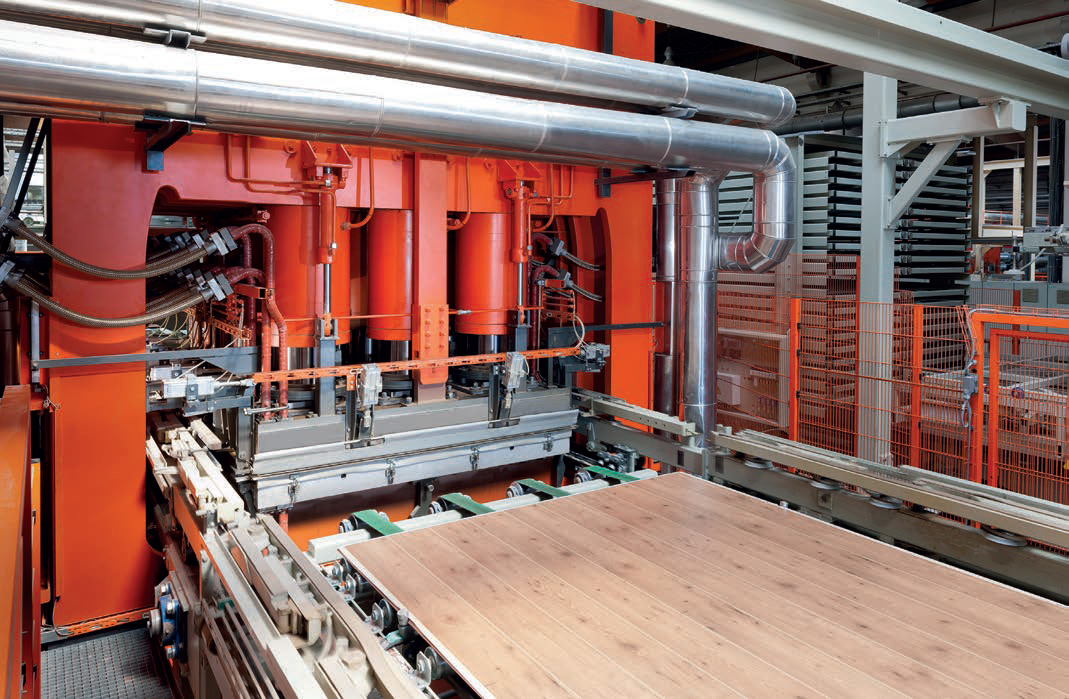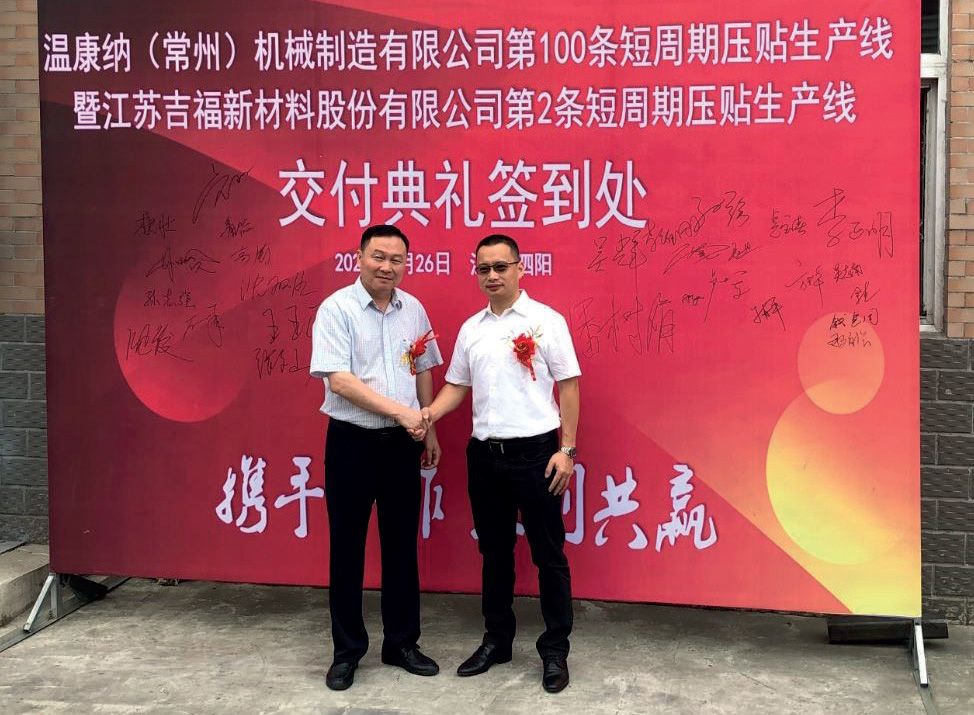Wemhöner presses on
29 January 2021World leader in short-cycle presses Wemhöner is meeting the furniture industry’s increasing requirements for small batch production and higher-value products. Stephen Powney catches up with the German company
When I caught up with world-leading short-cycle press technology producer Wemhöner Surface Technologies recently, the company’s Herford HQ and main production centre was working at maximum output despite the coronavirus pandemic.
Thomas Niedermaier, Wemhöner sales director and Detlef Hanel, sales manager, updated WBPI with latest developments in its world of short-cycle presses and membrane presses.
The company, founded in 1925, has production bases in Herford and Changzhou, China, with approximately 90% of its production exported around the world. The onset of the pandemic was naturally a shock to German manufacturers, including Wemhöner.
“At the beginning of the pandemic everyone here in Germany was afraid and we had a few orders put on hold,” explained Mr Niedermaier.
“But two or three months later all these customers came back and said they would like to have the order and to the original schedule, which put some pressure on our production schedule.
“We then experienced more and more requests for quotations for new lines and we realised that the furniture industry and the laminate flooring industry were not really affected by the pandemic. These customers got more business after the first shock of lockdown.
“In many areas the DIY markets in Germany were open the whole time and so people who were furloughed from work started to remodel and improve their homes. People had money because they were not able to go on holiday so they spent on their homes.
“This is a trend which is still going on and as a result our customers are all very active and we are getting above average number of requests for new lines. We are at 100% production capacity.”
A learning curve for all Wemhöner staff was new rules to reduce the risk of Covid-19 infection – keeping distances, increased hygiene efforts and wearing masks.
One pandemic-related problem experienced by Wemhöner was on the logistical front.
Mr Niedermaier said Covid restrictions hampered installation of lines in the early part of the year and then when further lines went out for delivery the company had double the number of installations to complete.
“We had double to do and less workforce since our people have to spend part of their time in quarantine. This has been the only problem for Wemhöner at the moment.
“All other things are quite good and when you see the overall economic situation on the television news, we think we are quite lucky.
Currently, Wemhöner has orders far into 2021. Its 2019 annual performance was described as a slightly lower in terms of order incomes but that is compared to the two previous years which had been at a very high level and included multiple line orders from big groups.
“Our industry is running in an anti-cycle to the normal industries, explained Mr Niedermaier. “When our industry is moving up, the other industries are down and viceversa.
“As soon as people can start to travel again then maybe the house is no longer the focus for spending.”
Changing Customer Requirements
Mr Niedermaier explained that the melamine overlay industry had experienced a big change during the last five years, with increasing requirements for textured surfaces and embossed in register (EIR) décors.
“The furniture industry has many companies still producing on short cycle press lines which are more than 30 years old and the lines cannot produce these new products. So, we are lucky that there is an exchange of existing lines going on.”
“The absolute volume of laminated boards is not increasing but in the long term the products which are demanded by the market cannot be produced by the old lines. The old lines are only half the speed, so they’re not efficient enough for high volumes, while they also don’t have the capability to make the high value products.”
Wemhöner is developing new technologies for the furniture board market to help customers adjust and become more efficient.
“The furniture manufacturing segment is changing from big volume orders to small batches, so we have to react to this with our machinery to minimise the downtime when orders in the line change.”
One example is the time taken to feed in new melamine paper for different product orders. A line which is capable of 220 cycles per hour may in reality only be operating at 80% of the time.
Wemhöner has developed technology to change paper pallets during operation of the line to eliminate the downtime. “We can turn the paper around very efficiently and in a fast way.”
This technology is fitted on Wemhöner’s new lines equipped for embossed in register production on the top and bottom sides of the boards. These newer presses operate at a higher pressure than before, going up to 70kg/cm2 pressure, compared to 30-40kg/ cm2 in the past.
The company plans to use the next Ligna show to showcase its expertise in short-cycle press technology for flexible, high volume, high-value and efficient production.
Markets
In the 3D membrane and vacuum press business area, sales manager Detlef Hanel explained that incoming orders were good, with Europe being a prominent region.
Poland, the UK and Romania are investing in new technologies for more capacity and to replace older, existing machines.
North America is also an encouraging market for 3D membrane presses.
Wemhöner’s Chinese business, which serves China and Asian markets, is currently really busy.
This year the Changzhou unit delivered its 100th short-cycle press – to customer Jifu. This customer bought its first shortcycle press line with EIR function, which can produce synchronised-design melamine faced panels, back in 2016.
Wemhöner China reported that in the first half of 2020 sales revenues of most Chinese furniture manufacturers had achieved almost the same level as last year.
New orders, coupled with an order backlog from 2019, meant Wemhöner China maintained full production throughout the pandemic.
To meet the increasing demand of markets, a second plant is being constructed in China, with an additional 7,000m2 of the new plant being put into use in 2021.
Back in Europe, Wemhöner has kick-started its relationship with Italy-based panels and furniture elements producer Saviola.
An order from the company, after a gap of 20 years, involves a short-cycle press line which was due to be installed in December, 2020.
“It was a big win for us to have this group back again as one of our European customers,” said Mr Niedermaier.
Elsewhere, Wemhöner is receiving enquiries from Russia, Turkey and South America.
An increasing customer requirement is for presses to be further integrated into main factory line processes.
“Sometimes this is a big challenge because these systems and interfaces need to talk with each other which is more about IT and not our traditional business of building machinery. You need programmers for this and it is a challenge to switch into this Industry 4.0.”

